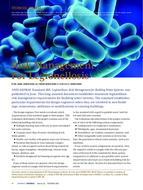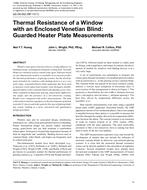Click here to purchase
Estimating energy savings from retrofitting existing building systems is traditionally a time intensive process, accomplished by developing a detailed building simulation model, running the model with actual weather data, calibrating the model to actual energy use data, modifying the model to include the proposed changes, then running the base and proposed models with typical weather data to estimate typical energy savings. This paper describes a less time-intensive method of estimating energy savings in industrial buildings using actual monthly energy consumption and weather data. The method begins by developing a multivariate three-parameter changepoint regression model of facility energy use. Next, the change in model parameters is estimated to reflect the proposed energy saving measure. Energy savings are then estimated as the difference between the base and proposed models driven with typical weather data. Use of this method eliminates the need for estimating building parameters, system performance, and operating practices since they are included in the inverse simulation model. It also eliminates the need for model calibration since the inverse model is derived from actual energy use data.
The paper describes the development of statistical inverse energy signature models and how to modify the models to estimate savings. Expected savings from inverse simulation are compared to savings predicted by detailed hourly simulation, and sources of error are discussed. Finally, the method is demonstrated in a case study example from the industrial sector. Limitations of the approach for complex building systems and the uncertainty of estimated savings are discussed.
Citation: ASHRAE Conference Papers, Las Vegas, NV
Product Details
- Published:
- 2011
- Number of Pages:
- 8
- File Size:
- 1 file , 730 KB
- Product Code(s):
- D-LV-11-C042


